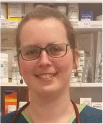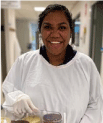Building health workforce capacity in Northern Australia
Michael Johnston A * , Heidi Smith-Vaughan A , Sophie Bowman-Derrick A , Jayde Hopkins A , Kelly McCrory A , Raelene Collins A , Robyn Marsh A , Kalinda Griffiths A and Mark Mayo AA Menzies School of Health Research, John Mathews Building (Building 58), Royal Darwin Hospital Campus, Rocklands Drive, Casuarina, NT 0810, Australia.

Michael Johnston is a senior research officer and program manager with the Ramaciotti Regional and Remote Health Sciences Training Centre (Menzies-Ramaciotti Centre), based at Menzies School of Health Research in Darwin, Northern Territory (NT). The Menzies-Ramaciotti Centre is developing a local and Aboriginal and Torres Strait Islander health sciences workforce in the NT. Following the completion of a combined Bachelor of Arts and Bachelor of Secondary Education and a Master of Human Rights in 2016 and 2019, Michael worked for the University of Sydney, the University of New South Wales, and the Tiwi Islands Regional Council in service of Aboriginal and Torres Strait Islander-led programs. Michael is a non-Indigenous person. Michael brings together his experience as a teacher, education designer, grants and policy officer, as well as a complex systems approach to address structural inequality in educational opportunities in Australia. In his current role, Michael takes an interdisciplinary approach to facilitating educational and career development opportunities with NT youth engaged in science, technology, engineering, the arts, and mathematics (STEAM). |

Associate Professor Heidi Smith-Vaughan is Associate Director for Research (HDR and Ethics), Head of HealthLAB, and Co-lead of the Menzies-Ramaciotti Centre. She is an investigator on clinical trials of the efficacy of vaccines and antibiotics for carriage, otitis media and suppurative lung disease in Australia and countries in the region. She also leads government and philanthropy funded outreach and health education programs. Heidi has a strong record in training and mentoring. She supports scientists in Vietnam, Papua New Guinea and Timor Leste in a range of in-country projects, and has a growing program of training for scientists in disadvantaged regions. In 2014 she co-founded the Menzies HealthLAB with Associate Professor Sue Sayers (deceased). She continues to lead this immersive, interactive community health education initiative which travels around the Northern Territory delivering interactive health promotion with >13 000 participants to date. |

Sophie Bowman-Derrick is a veterinarian. In 2019, she completed the Master of Philosophy (Applied Epidemiology) through the Australian National University, with her thesis focused on antimicrobial resistance. Sophie is currently completing the Doctor of Medicine through Flinders University’s NT Medical Program and intends to train as a rural general practitioner. Alongside her studies, Sophie provides administrative and executive support for the Menzies-Ramaciotti Centre. |

Jayde Hopkins is a proud Gurindji and Woolwonga woman from Darwin. She is currently completing her undergraduate degree in Biological Sciences at La Trobe University. She is fascinated by microbiology and genetics and hopes to become an infectious disease researcher. Jayde is currently working at the Menzies-Ramaciotti Centre as a project assistant, artist-in-residence, and peer trainer. |

Kelly McCrory first started her journey at Menzies in late 2016 as a work experience student with the Melioidosis team. Her main role in the team is environmental work. The opportunity to get hands on experience in and outside of the lab sparked her interest in pursuing a career in environmental science. Kelly currently works as a Menzies-Ramaciotti Centre peer trainer, developing and delivering laboratory training. She commenced a Bachelor of Environmental Science degree in 2020 after completing a tertiary enabling program (an alternative pathway into university). |

Raelene Collins is a Kuku Yalanji and Garawirrtja woman who grew up in Darwin. She is currently undertaking a Bachelor of Nursing degree at Charles Darwin University. Raelene completed a Certificate III in Laboratory Skills in 2019, currently works as a Menzies-Ramaciotti peer trainer, and develops health promotion resources. |

Dr Robyn Marsh is a Senior Research Fellow in the Child Health Division of Menzies School of Health Research, Darwin, Australia where she leads the Paediatric Respiratory Microbiome Program. She is one of the Centre’s Co-leads and is an Associate Investigator of the Centre for Research Excellence in Bronchiectasis in Children (https://www.crelungs.org.au/). She is a current Rebecca L Cooper Al and Val Rosenstrauss Fellow and a previous NHMRC Frank Fenner Fellow (2011). Her research focuses on microbiological drivers of chronic airway infections among children, with special interest in chronic suppurative lung diseases, upper airway health and middle ear infections among under-served paediatric populations. |

Dr Kalinda Griffiths is a Scientia Senior Lecturer at the Centre for Big Data Research in Health, University of New South Wales. Kalinda’s work addresses complex health disparities in populations by using existing administrative data. She holds honorary positions at the University of Melbourne and Menzies and is Deputy Editor of the Health Promotion Journal of Australia. Her research currently addresses issues of quality and the utilisation of Indigenous data with a focus on data governance, measurement and cancer care and outcomes. Kalinda is the recipient of a number of awards. Notably, she was awarded the Northern Territory Young Australian of the Year in 2011 and more recently, the 2019 Lowitja Institute Emerging Researcher Award. She was also a 2019–2021 Science and Technology Australia Superstar of STEM. |

Mark Mayo is of Aboriginal and Torres Strait Islander heritage whose great grandmother, Polly Warrumbul, was a Mudpurra woman from Wave Hill. Mark’s Torres Strait Islander heritage comes from the descendants of the people of the islands of Mabuiag and Badu in the Torres Strait. Mark is a graduate of Charles Darwin University and is a research scientist with over 30 years’ experience. Mark’s interests in Australian First Nations people’s health has led him to work on many research projects during his time at the Menzies School of Health Research from malaria, melioidosis, petrol sniffing and childhood ear diseases. Mark’s primary research area has been melioidosis, a potentially fatal tropical disease found in Northern Australia. Mark’s research into this disease covers many different aspects, from early detection of the disease in hospital and clinical settings, to understanding the environmental niche of the bacteria and the potential exposure risks to people and animals in an endemic region. Mark is adept at identifying the implications of range of developments on Aboriginal people and potential consequences for the land (especially soil). Mark is currently the manager of the Melioidosis Research Program and Associate Deputy Director of Indigenous Leadership and Engagement at the Menzies School of Health Research. |
Microbiology Australia 43(3) 93-97 https://doi.org/10.1071/MA22031
Submitted: 26 July 2022 Accepted: 16 September 2022 Published: 6 October 2022
© 2022 The Author(s) (or their employer(s)). Published by CSIRO Publishing on behalf of the ASM. This is an open access article distributed under the Creative Commons Attribution-NonCommercial-NoDerivatives 4.0 International License (CC BY-NC-ND)
Abstract
The Menzies Ramaciotti Regional and Remote Health Sciences Training Centre (Menzies-Ramaciotti Centre) is located within the Menzies School of Health Research (Menzies) in Darwin, Northern Territory (NT). The Menzies-Ramaciotti Centre is contributing to the development of a local health workforce in the NT, including a strong biomedical workforce. The Centre facilitates health workforce career progression for regional and remote youth, with a focus on career development for Aboriginal and Torres Strait Islander (First Nations) youth. The Centre works in collaboration with a range of industry and education partners, who also have strong workforce development goals and a commitment to serving a vital community need to build pathways into work and study with First Nations peoples. Part of the Centre’s focus entails delivery of high-quality training in biomedical sciences, including theoretical and practical skill development in microbiology, laboratory techniques, immunology, public health, data science, allied health, and health research. The Centre uses a non-linear, strengths-based approach to training with a multiplicity of entry and exit points including high school work experience placements, traineeships, vocational placements, as well as undergraduate and postgraduate placements.
Keywords: Aboriginal and Torres Strait Islander health, biomedical, capacity building, First Nations, health sciences, northern Australia, regional, remote.
References
[1] Australian Bureau of Statistics. Remote Australia (NT), 2016 Census All persons QuickStats. https://abs.gov.au/census/find-census-data/quickstats/2016/RA73[2] Australian Bureau of Statistics. Very Remote Australia (NT), 2016 Census All persons QuickStats. https://www.abs.gov.au/census/find-census-data/quickstats/2016/RA74
[3] Australian Bureau of Statistics (2022) Schools – Data on students, staff, schools, rates and ratios for government and non-government schools, for all Australian states and territories. https://www.abs.gov.au/statistics/people/education/schools/latest-release
[4] Australian Bureau of Statistics (2021) 2021 Census All persons QuickStats. https://www.abs.gov.au/census/find-census-data/quickstats/2021/7
[5] Fitts, MS et al.. (2021) Understanding and responding to the cost and health impact of short-term health staffing in remote and rural Aboriginal and Torres Strait Islander community-controlled health services: a mixed methods study protocol. BMJ Open 11, e043902.
| Understanding and responding to the cost and health impact of short-term health staffing in remote and rural Aboriginal and Torres Strait Islander community-controlled health services: a mixed methods study protocol.Crossref | GoogleScholarGoogle Scholar |


